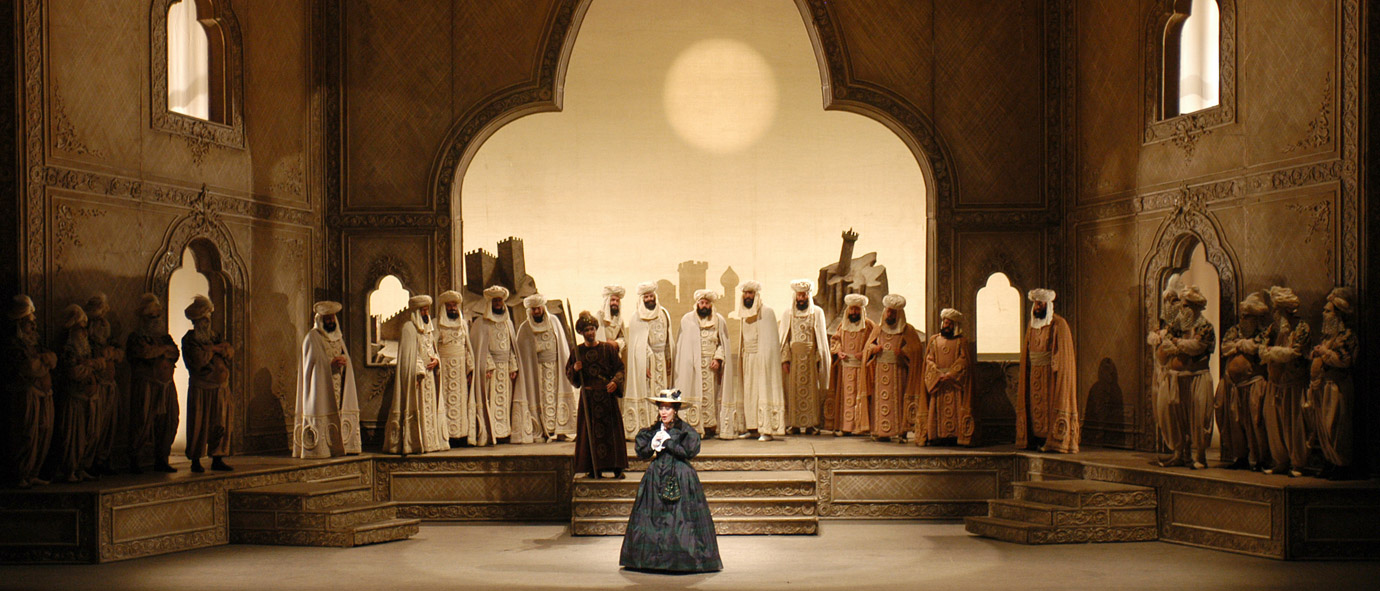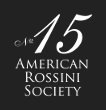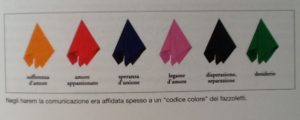What color handkerchief will you be waving? Click on picture to learn more!

L’Italiana in Algeri will be starting its Met on October 4th,with an all-star cast conducted by the beloved James Levine, and an absolutely exquisite production by Jean-Pierre Ponnelle which the Met has had the wisdom to retain.
The cast includes Marianna Pizzolato *#,Ying Fang,Rihab Chaieb, Rene Barbera #,Nicola Alaimo *#, Dwayne Croft, and Ildar Abdrazakov.
* graduates of Accademia Rossiniana
# Performed at Rossini Opera Festival
This is an opera to be simply enjoyed! The story is clear and uncomplicated; the music is Rossini at his best; and there are no really “bad guys” just a character who needs a little “attitude adjustment” which is provided by L’Italiana and her co-conspirators.
This does not mean, of course, that this opera is without complication when you dig a bit into its history and what was going on in the world at the time of its composition
We are fortunate that Philip Gossett, one of the world’s foremost Rossini scholars has written at some length about L’Italiana in his book “Divas and Scholars.” We will get to some of his points later.
First it might be good to address the matter of how audiences viewed that part of the world at the time the opera was composed, and how it is viewed today.
Today, nothing says it better than this picture from a recent, award-winning performance at the Rossini Opera Festival in Pesaro. The production is by Davide Livermore, who really went over the top in his irreverent and spot-on take on the story.
Then there is a more sober account of how audiences viewed that part of the world in the past, found in an interesting new book by Larry Wolf, “The Singing Turk” ( learn more at www.singingturk.com)
Actually it is likely that Rossini and his audiences were more pre-occupied by what was happening among European countries at the time of the premier, than any external threats. The censors certainly weighed in on some of the text ( although Rossini cleverly included a musical reference that most audience members would have picked up on). The example is from Gossett’s book.
Gossett points out that ” “L’Italiana in Algeri was more problematic to the censors than many other Rossini operas, and he cites the changes to just one aria, the famous “Pensa alla patria” ( Think of your country). Certainly when sung by someone like Marilyn Horne one could easily understand that this might have been a call to “rally the troops”, and in the case of Horne, Americans might have been forgiven for thinking that she was singing to them!
In Rome the censors changed the line to “Pensa allo scampo ” ( think of escape ). Yet another substitution was “Pensa alls sposa” ( Think of your wife). It may be hard to understand that in those days words actually meant so much that the censors felt it necessary to make such changes. Modern audiences have become quite used to the fact that often a libretto’s words have no connection to what is seen on stage.
Gossett also addresses orchestral changes and these are quite interesting because Rossini’s operas are often ill-served in large houses with large orchestras. The changes that piled up over the years affects, as Gossett says, “the very texture of the score”. Just one example serves to illustrate this point. Rossini did NOT use trombones in his operas ( with rare exceptions) but over the years three trombones turned up in the score!
The history of misguided alterations was finally stopped when the Fondazione Rossini “restored the opera to its correct orchestral format” as Gossett says, continuing “The delicacy, lightness,and precision of Rossini’s orchestration was scarified to a late nineteenth-twentieth-century vision of orchestral sonority and was then sanctified by ignorant twentieth-century musicians as belonging to the “tradition,” a “tradition” invented by musicians with no sense of Rossini’s orchestration and totally extraneous to the opera that delighted all Europe during Rossini’s lifetime.”
In spite of all these attacks on Rossini’s score, L’Italiana has managed to survive and in the right hands delights audiences today as it did back when it was first performed.
Oh, the handkerchief! Opera houses in Italy often provide the program books that are real treasures. The Teatro Comunale of Bologna is no different. We have included a picture featured in one of their recent books with a guide to the colors of the harem. When you attend the Met, be sure to look around for signals!!



